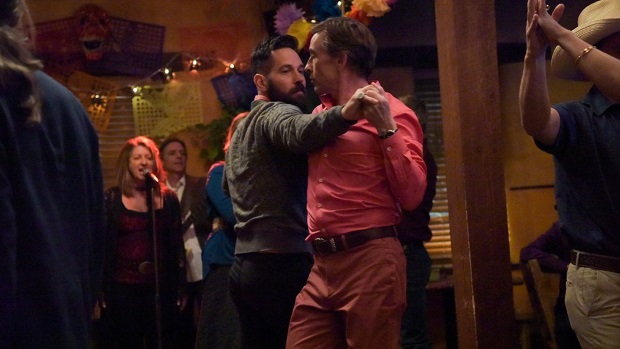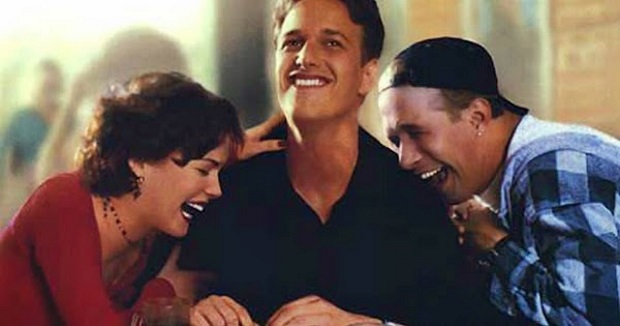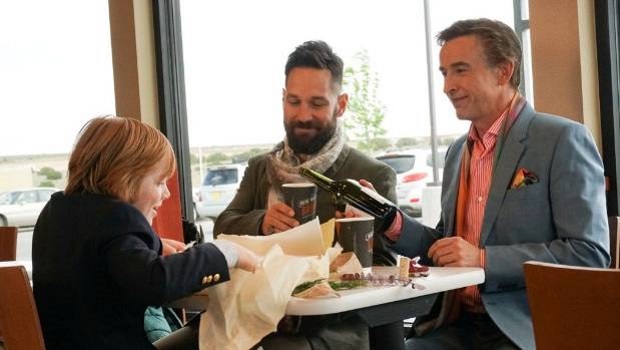Andrew Fleming interview: Ideal Home, LGBTQ representation, The Craft
Writer and director Andrew Fleming talks Ideal Home, Paul Rudd, Steve Coogan, Insatiable, The Craft and more...
Andrew Fleming is a filmmaker who’s been away from the big screen for too long. In the 90s, as writer and director, he brought us films such as Threesome, The Craft and Dick. He also helmed the big screen Nancy Drew movie, amongst his varied ensemble of projects.
After concentrating primarily on television for the last decade, though, Fleming is back on the big screen now with his new movie, Ideal Home. Reuniting him with his Hamlet 2 star Steve Coogan, the film also features Paul Rudd. Fleming made the film independently, outside of the Hollywood system. And as the film plays on UK cinema screens and via video on demand services, he spared us some time for a chat about it…
It feels like it’s been too long since we’ve had a film from you! Given that this film has such a personal edge to it, how does the actual week of release feel this time? Is it any different from your bigger studio pictures?
It’s always a complicated thing! Letting go of something, reliving making it. It’s been a long road making this movie. But I’ve happy with it. I’ve got a mixture of feelings. I’m more intensely happy, because it’s so personal.
You’ve been up front about this film very much has your heart and soul in it. But then I don’t think that’s massively different to your usual approach?
Definitely. I always try and personalise things. I can only really work on something if I feel I can identify with the characters. But this is more so, for sure.
Can we pick up on you identifying with the characters? Because you’ve talked in other interviews about how you came up the character of Erasmus and Paul – played by Steve Coogan and Paul Rudd – but they weren’t initially intended for this story. Can you take us through what happened?
Paul and Erasmus were actually written for a different story! I liked the characters, and I thought it’d be fun to make them talk, and give them things to do. But it never really came together until somebody suggested I write about my life. I was living with a gentleman and his son from his marriage to a woman at the time, and I thought oh, there should be a kid. This couple should have a kid, and be unlikely parents. It had the effect of bringing them down off their complacency. I liked how flawed they were. What a train wreck they make as parents. I think gay parents are either generally depicted as being these noble, perfect people – because it’s a lot of work to become a parent if you’re a gay couple, especially two men. It takes a lot of resources, and you have to jump through a lot of hoops! This was a bit messier than that.

You touch on complacency as a relationship theme. You’ve talked about how these characters have been in your head for a long time. But I wonder: had you realised them in the film ecosystem as it was ten or 20 years ago, would complacency still have been one of the key things in their relationship that you explore on screen? I wonder if Hollywood would have wanted something more overt and flamboyant?
The tone is generally the same. When the project started, Paul and Erasmus as I said predated writing the script. But I wrote this about ten years ago. It improved over time and got better. I think it got funnier too, and particularly when Steve Coogan and Paul Rudd came on board. It didn’t change the script, but I think they made it much better. And I never really tried to make this within the Hollywood system. It was always an independent film. I don’t think I even went through the motions of seeing what a Hollywood studio would make of the script. I figured it’d never happen.
It’s interesting that your film now follows Love Simon into cinemas by a couple of months, which finally did see a Hollywood studio following a gay romance story. One of the most interesting critiques I read of that film was that what makes it so special is it’s so ordinary. No slight to it, just the story is so down to earth and relatable. But in your case, it sounds like the studio wasn’t an option: has the video on demand model been a saviour here?
The VOD model is the logical extension of the way things have always been. You make a movie, some people see it in theatres, but in truth, people tend to find movies over time, on other platforms. From tape, to disc, to download. That’s where films really live nowadays. I ask people when the last time they went to a theatre to watch a movie was, and they draw a blank. Right, I see what you’re seeing. It’s the same old thing. Even when I made my first film, it was the era of videotape. When people say ‘you’ve got to go see this’, it’ll be more likely they rent or buy it.
I remember seeing Threesome, one of your earlier films on the big screen. I like the film an awful lot, but it took me two runs. The first time, during a more amorous scene, a couple on the front row, er, ‘joined in’. It was surreal…
[Laughs] A couple in the theatre were…?
Loudly in time to your film!
You mean saying the lines?
Er, no. Doing some of the actions…
[Laughs]

But films like Threesome and The Craft were and are such character films. But I wonder if you feel with the state of modern cinema if we’re losing characters in big multiplex releases?
Well, yeah. There are two types of films. There are films that are marketed with set pieces and action and special effects. And there are movies are about people. Sometimes they can be both of those, but yeah, it feels like movies about people are fewer and fewer. And a large number of the creative types who tell stories about people have migrated to television. That’s a wonderful place now. It wasn’t necessarily always the case. But I’ve been working in television and I enjoy it. It is dramatic how much things have changed.
You’re doing a Netflix show, Insatiable. Can you tell us a bit about that, and the ecosystem in which you’re making that? Do you have the space and freedom to tell your story?
Yeah, that’s the thing. Television used to be this cookie cutter format, and now it’s wide open. There are all different kinds of shows. And depending on where you are, there’s a lot of creative freedom. You also have this freedom of time, that you can explore a lot of different story with a lot different characters. Insatiable is 12 hours, and that’s a big movie! That’s a big canvas.
Is it fun? Have you enjoyed it?
It’s challenging! But I’ve had a lovely time. I’ve been doing television for a long time. It’s fun. It happens faster, it’s more fluid, it’s more collaborative. There are more writers, it’s a team effort. But it’s a blast.
Did you find the same with making Ideal Home, given how independent the movie is?
Yeah. This was very much an off on our own project, making this movie by ourselves. Which is nice. It’s nice to be able to do that. But then it’s also nice to have a different kind of experience. Insatiable is a different. It’s more a family, and they’re both valid.

Over the end credits of Ideal Home is a montage of family pictures, that I thought was a really beautiful touch. I sat there finding myself wanting to know the individual stories behind the pictures. It looks the simplest thing on screen, but I suspect it was logistically very tricky. Where did the idea to do that come from? Was it a day one thing? And how easy was it to come together?
It happened during editing. I really don’t know where it came from. I came into the editing room one day, and mentioned it’d be good to have pictures of real gay families in a montage. And the editor got a chill, and said it was a really good idea!
It was a lot of work to find the pictures that we liked, then track down the family. Everyone has to sign off. It was a lot of work, and it took a long time.
But it was interesting: I kind of got to know the stories of all of these different people. Some more than others. It was fascinating. What happened was that I was so hypnotised by each of the pictures. Each suggests a whole other world, and there are a lot of stories. It’s a shame there aren’t more alternative families in movies.
It’s such a lovely touch.
It was also a slightly corrective idea. I’d been aware that the movie is really quite apolitical. Nobody really takes a stance. That was intentional. I didn’t want it to be preachy. But I thought it was nice to throw that in at the end. I’m not really sure it’s a political statement, really. I just like the idea of being able to celebrate it. A celebratory moment.
I should also add that I’m a huge fan of the films of Kevin Costner. I wanted to commend you on being the first filmmaker to present a scene of a person uttering the words “Dances With Wolves” at the moment of release in a sex scene! I’m more of a Field Of Dreams man myself. But again, where do moments like that come from? Is that scripted or on set?
You know, that scene was always there in one form or another. I think the tag ‘Dances With Wolves’ came about the week before, when Steve and Paul and I were sitting there! All of the setup was there, but that last line wasn’t! It just made us laugh.
Before we finish, as much as your film presents a non-political story, I do think that the way it’s had to be made and funded adds to questions about how LBTQ issues are represented in modern cinema. What’s your view on that? As a filmmaker and an audience member?
I didn’t think that much about it. I was just trying to tell my truth. But I realised after the fact that we kind of went out on a ledge with the movie. They are not moral examples. They’re not role models. They’re messy people. I think that’s difficult for people because they’re losing hair, they’re drinking too much, they’re fighting, they’re saying things they shouldn’t be saying in front of the kid. And also they’re unapologetically gay, and I think some people are taken aback by that. It makes some people anxious. But I’m glad that I didn’t filter myself. I think that if I’d thought about it I might have been a bit more cautious. But fuck it. I think it’s better to be out there, and funny, and racy.
And quickly before we go: do you have any involvement in the new take on The Craft that’s reported to be happening?
Not at the moment, no. I’m not sure what’s going on what that, to be honest!
Andrew Fleming, thank you very much!
Ideal Home is in UK cinemas now.